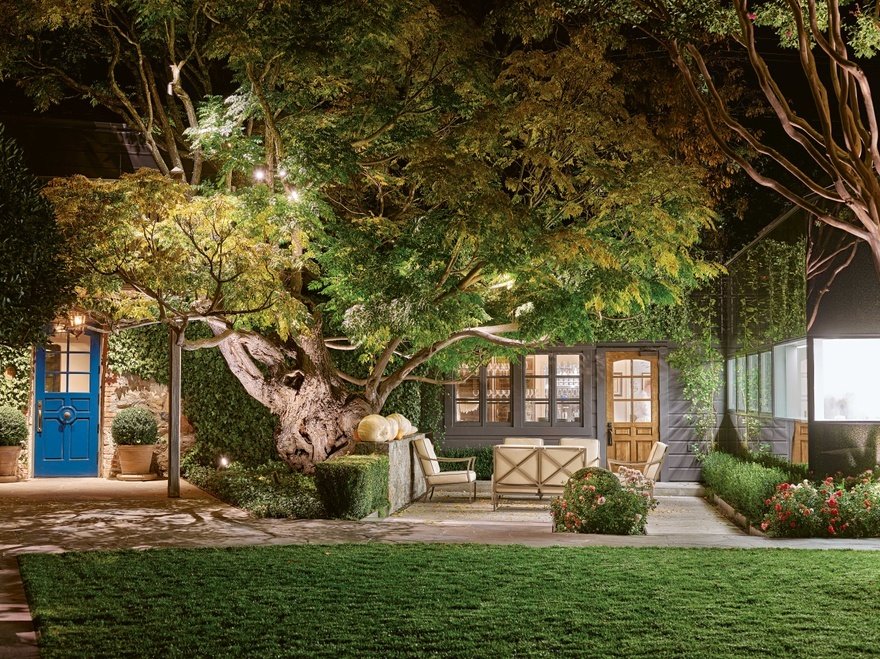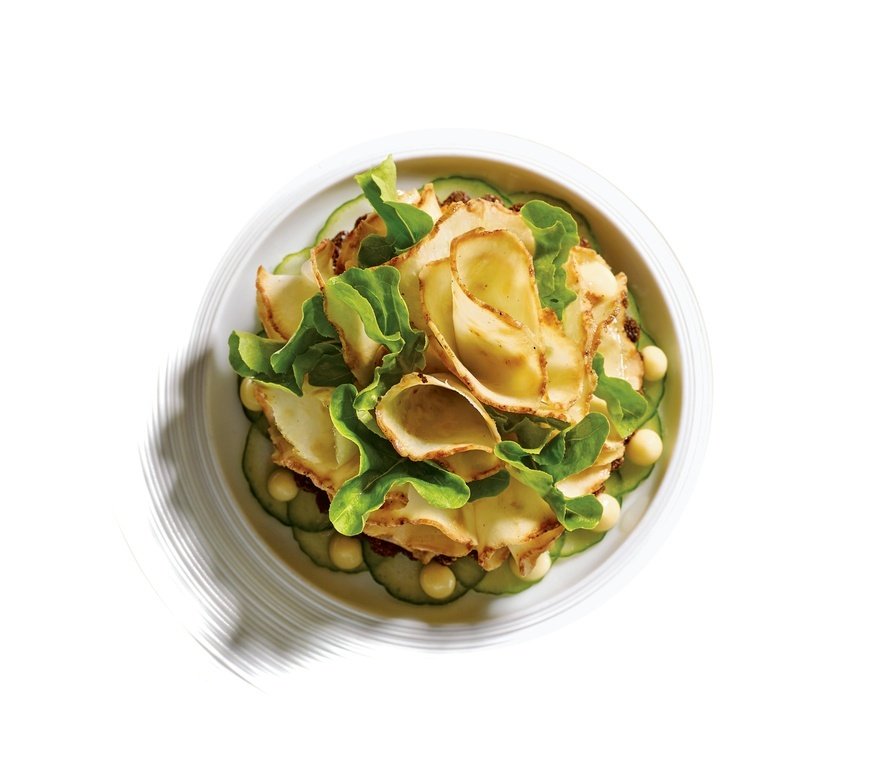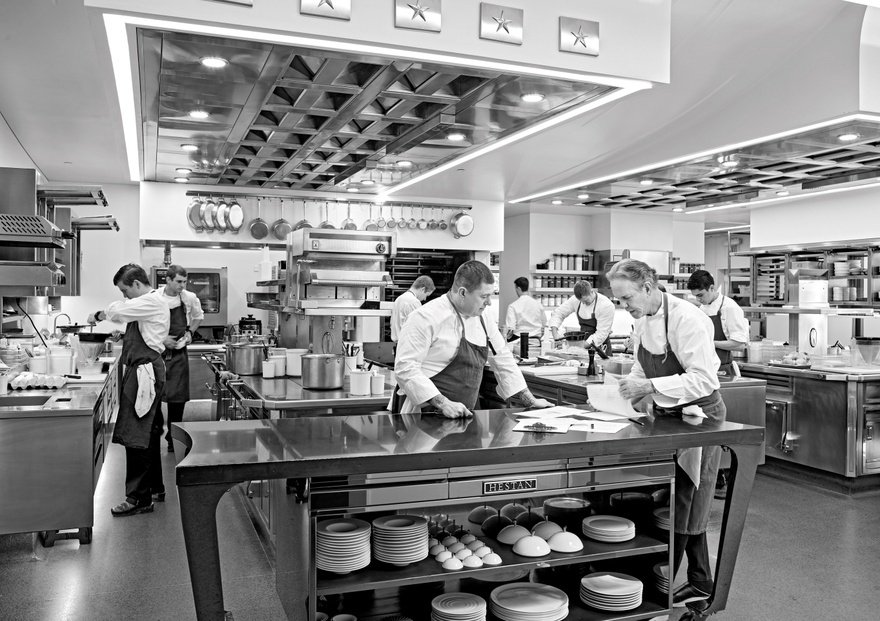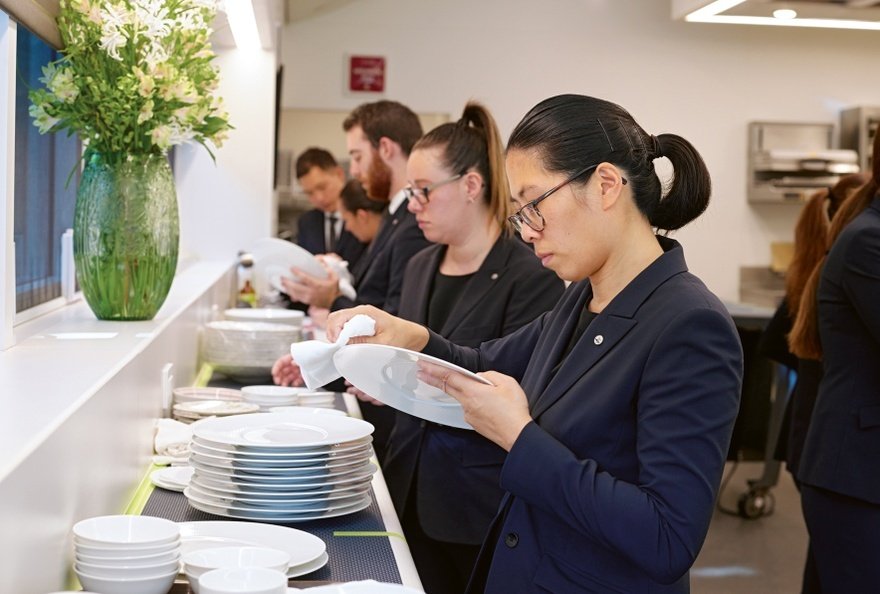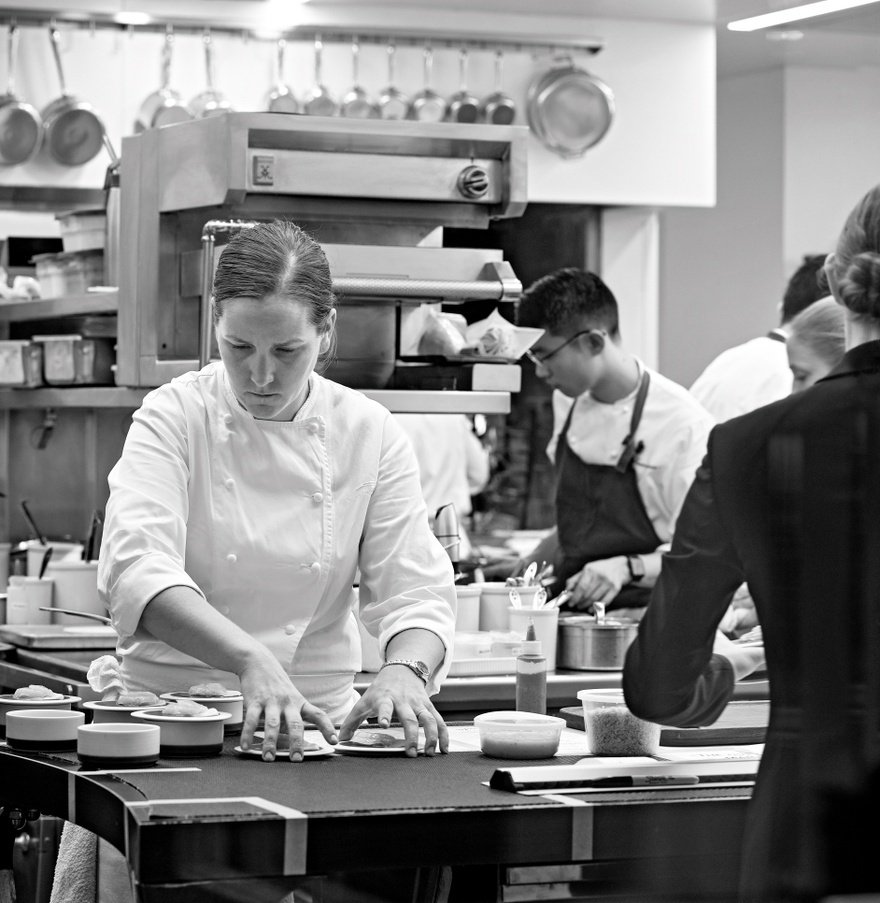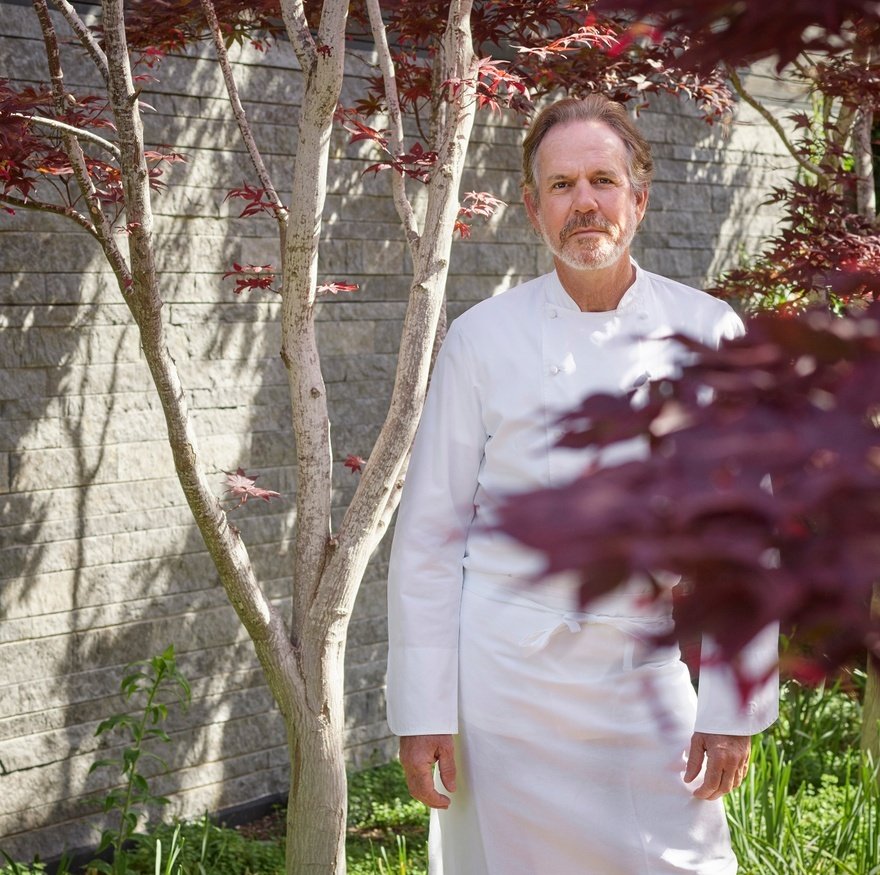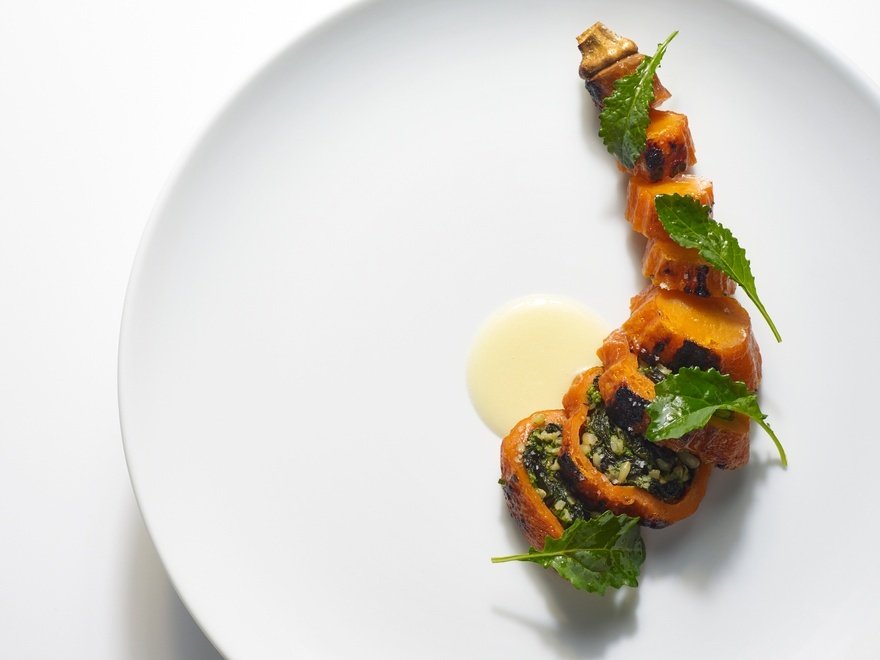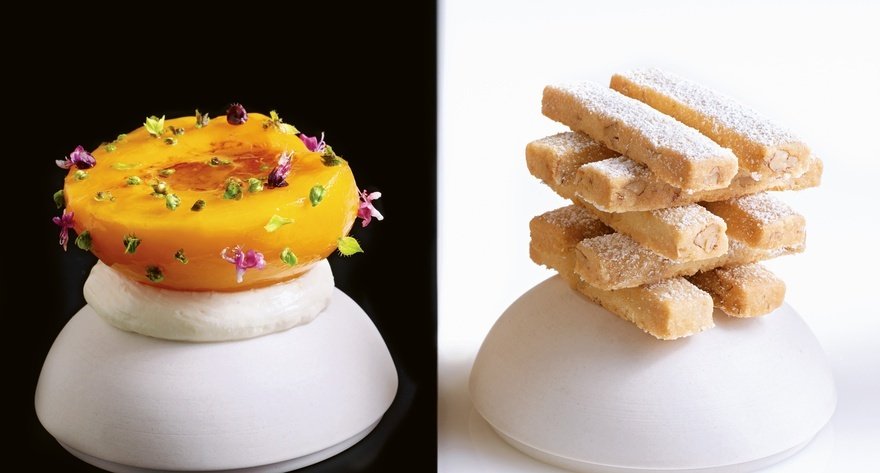Thomas Keller on why fine dining will survive the pandemic
As well as weathering the storm of Covid-19, chef-restaurateur Thomas Keller has found himself in the unwanted position of having to justify the price of fine dining. He tells Sophie Witts why the sector is vital and how he expects it to bounce back and evolve.
Thomas Keller is tired of defending fine dining. It seems reasonable to ask whether restaurants such as his own, where prices stretch into the hundreds of dollars, may be hit hard by the pandemic. But the American chef is having none of it.
"Do you think it will impact casual dining?" He shoots back down a muffled phone line from California. "All restaurants are struggling, whether they're fine dining or casual. The only places doing well are fast-food drive-throughs. But once we get over this, the restaurant community will bounce back."
We're speaking following the publication of Keller's first book in over a decade, The French Laundry, Per Se, a £60 tome in which the chef discusses the evolution of his two most famous restaurants, as well as fine dining in general, over the past 26 years. In normal times this would be a chance to reflect on his achievements, but the pandemic has disrupted what would have been an otherwise conventional media tour.
At the age of 65, Keller has had a career of which many chefs could only dream. Since opening the French Laundry in California's Napa Valley in 1994 and sister site Per Se in New York in 2004, both restaurants have earned three Michelin stars, making Keller the only American chef to simultaneously hold the two triple ratings. He has also won one star for his Bouchon bistro in Yountville, California, launched a string of more casual restaurants across the US, written five books and had a cameo in Pixar film Ratatouille. He led the US team to its first-ever gold at the 2017 Bocuse d'Or competition and was the first American chef to be designated a Chevalier of the French Legion of Honour, France's highest order of merit, in 2011.
The Covid-19 crisis
It all begs the question of what could come next, but in 2020 the future is uncertain. The coronavirus shutdown has brought heartache to the hospitality industry around the world, and Keller's empire has not been immune to the crisis.
"It's been devastating," he says. "We had a business on 18 March, and by the 19th it was gone. We went from having employees, paying taxes and supporting our suppliers to nothing. It was like turning a light switch off. We're still struggling and just trying to survive."
Like many chefs, Keller has had a difficult year. Over the summer the collapse of New York's tourist trade meant he permanently closed TAK Room, the fine dining restaurant he opened in the luxe Hudson Yards development just one year ago. Two of his Bouchon bakeries in the city also shut for good.
Keller is among a growing number of restaurateurs suing their insurance companies over claims related to the Covid-19 pandemic. Like with many other operators, his insurer refused to pay out to cover losses for business interruption, and the case is still ongoing.
In April he also faced backlash, both on Twitter and in the media, for joining fellow chefs Wolfgang Puck, Daniel Boulud and Jean-Georges Vongerichten on the White House's Economic Council for Restaurants, a group tasked with advising the US government on saving the devastated industry. Much of the criticism was levelled at the lack of diversity among the group, as well as its position advising President Trump, but Keller hit back at the "haters and cynics", tweeting that fighting for the industry's future was "not a partisan issue".
Eight months on from the initial shutdown, he believes the long-term impact on restaurants is still yet to be seen.
"About 50% of restaurants will not survive. Eventually there will be a great realisation of the devastation that has occurred that we're not really seeing right now."
A fine art
Both of Keller's flagship restaurants have weathered the storm so far. Per Se reopened for dinner on 15 October and the French Laundry began offering indoor dining in September after two months of outdoor meals. Its return, announced in an Instagram post, raised eyebrows for offering a private dining experience starting at $850 (£635) a head, due to reduced seating capacity.
The restaurant has now returned to its pre-pandemic prices, starting from $350 (£262) per person for its 10- or 11-course tasting menus, available seven days a week.
Keller makes the economic argument for fine dining in his new book, admitting that though its prices are "a magnet for criticism", they are justified by helping to support a huge network of staff and suppliers. "I've been around long enough to have read its obituary many times – but fine dining never dies," he writes. "It evolves, pushed on by new generations and new ideas."
I've been around long enough to have read its obituary many times – but fine dining never dies. It evolves, pushed on by new generations and new ideas
On the phone, the chef is polite and measured, but the conversation turns heated when questioned on his need to defend the expense of his craft.
"It's a fascinating thing for me as a chef that one category of a huge industry continues to get singled out as an area that is not necessarily contributing to the overall betterment of our communities," he says.
"I think this is where media kind of forgets what the purpose of a restaurant is, regardless of the style it is. There's no ego involved here. There's no agenda. We're here to bring our guests a wonderful experience. We're open for everybody, we don't discriminate. Anybody can come from any political background, gender, ethnicity – it doesn't matter."
He is frustrated at articles suggesting fine dining is elitist, which he believes betray a lack of understanding of the work put in at restaurants behind the scenes.
"We don't have an elitist attitude, but we're an elite restaurant because of the quality of work we do. There are 125 young people that work in this restaurant seven days a week – much harder than most people will work.
We don't have an elitist attitude, but we're an elite restaurant because of the quality of work we do
"The ingredients we use are scarce and rare because of the farmers, fisherman, foragers and gardeners who dedicate their lives to producing the best ingredients possible. We're supporting a whole fragment of the workforce.
"Our job is to make sure we deliver these ingredients to our guests in a way which expresses the quality of their work.
He adds: "This is why these kinds of restaurants are more expensive than others. There's a reason behind that, and that reason is valid."
Evolution of restaurants
Over Keller's 45-year career, fine dining has evolved to become an even more precise and meticulous practice, backed up by technical wizardry.
The shift is demonstrated in the pages of The French Laundry, Per Se. Despite being released 21 years after his best-selling The French Laundry Cookbook, its recipes are noticeably more complex. To an amateur cook his kitchens now sound more like laboratories than a place to prepare food, with dehydrators, vacuum sealers and immersion circulators sometimes used to create a single dish.
Production of his famous salmon tartare cornet, which was inspired by a trip to Baskin Robbins and is still served at the French Laundry and Per Se, has evolved from a pain-staking method to a slicker operation using grinders, drum sieves and batch stencils the size of baking trays. More than 1,000 cornets a week can now be made and put in containers to stay fresh using a chamber vacuum sealer. Keller calls the kit "one of the greatest technologies to enter the professional kitchen".
Technology aside, the chef says he is proud of how the culinary industry has evolved in both the US and UK over his lifetime.
"When I started working in restaurants it was not a job that any parent would aspire to want for their child. I've watched both our countries go on a parallel path from zero respect to becoming two places in the world that have some of the best restaurants, chefs and ingredients."
Keller ran a £250 a-head pop-up version of the French Laundry at Harrods in London in 2011 and has high praise for the local dining scene. He name-checks London's Kitchen Table, run by Per Se alumni Sandia Chang and James Knappett, as well as venturing further out to Heston Blumenthal's restaurants in Bray, Berkshire.
"The UK is chock-full of wonderful chefs doing fine dining, casual dining, bistro fare, gastropubs. Look at Heston Blumenthal, he's become one of the most recognised chefs in the world. Who doesn't want to walk into the Hind's Head and have the split pea soup?"
But he is quick to clarify that it's not just chefs that deserve the praise. While the kitchen teams can command the most attention, they are part of a far larger operation.
"Restaurants are not just culinary, service and environment are a huge part of that. As much as chefs have gotten the recognition, it's our farmers, fisherman, foragers, dining room teams, porters and reservation teams that make a restaurant what it is."
Restaurants are not just culinary, service and environment is a huge part of that
Looking ahead
As times have changed, so has Keller's role at his own restaurants. He now likens himself to the boss of a sports franchise overseeing a team of athletes – the chefs, servers and managers who make the business a success. The French Laundry and Per Se are famously linked by a live video feed, and there is a constant collaboration between the two restaurants. His book is an ode to this ‘community' as much as it is a reflection on his own work, and features contributions from chefs and profiles of the restaurants' suppliers.
But back to the question of the future. With such a successful career behind him, what's left for Keller to achieve? "I want to break 80 in golf," he jokes, before turning more serious.
"As we mature in our careers we want to make sure the next generation have what they need. We are here for a specific amount of time and if we're not preparing them to take over and do better than us, then we're not doing our jobs."
We are here for a specific amount of time and if we're not preparing the next generations to take over and do better than us, then we're not doing our jobs
He says French Laundry executive chef David Breeden and Per Se's chef de cuisine Corey Chow, who both rose through the ranks to take over the famous kitchens, have surpassed his own skill.
"They have better training and tools and environment. As chefs our job is not just about our restaurant, it's to elevate the standards of our profession. If we're not doing that as business leaders, then we're truly not being responsible."
The chef is confident that the restaurant industry will survive its current crisis. He believes people's desire to dine out will only be stronger after a tough year.
"With every catastrophic event in history, going back to the Spanish flu or the stock market crash, the one thing that people keep yearning for and coming back to is restaurants. They're a place to find solace and moments of celebration, nutrition and nourishment.
"It's going to be devastating for a lot of careers, where people have lost everything, but in the long run restaurants will bounce back in a great way. There are going to be a lot of opportunities for people."
As our call comes to an end, I ask Keller if there is anything he would change about the last 26 years since he opened French Laundry – the troubles of 2020 aside. He takes a moment to weigh this up.
"If anybody looks back on their life and career, there's always something they would do differently. What happened with the French Laundry and Per Se was historic in the US. No one has done it since. Would I choose a different location or design? I could have done, but then we wouldn't have achieved what we did.
"So no," Keller laughs. "I wouldn't have done anything differently."
The French Laundry, Per Se, by Thomas Keller, published by Artisan Books, is out now.
Excerpted from The French Laundry, Per Se by Thomas Keller (Artisan Books). Copyright © 2020. Photographs by Deborah Jones## Thomas Keller's restaurants
California
- The French Laundry (three Michelin stars, since 2007)
- Bouchon (one Michelin star, since 2007)
- Bouchon Bakery
- Ad Hoc + Addendum
- La Calenda
New York
- Per Se (three Michelin stars since 2006)
- Bouchon Bakery & Café
Las Vegas
- Bouchon
- Bouchon Bakery
Miami
- The Surf Club
Continue reading
You need to be a premium member to view this. Subscribe from just 99p per week.
Already subscribed? Log In



